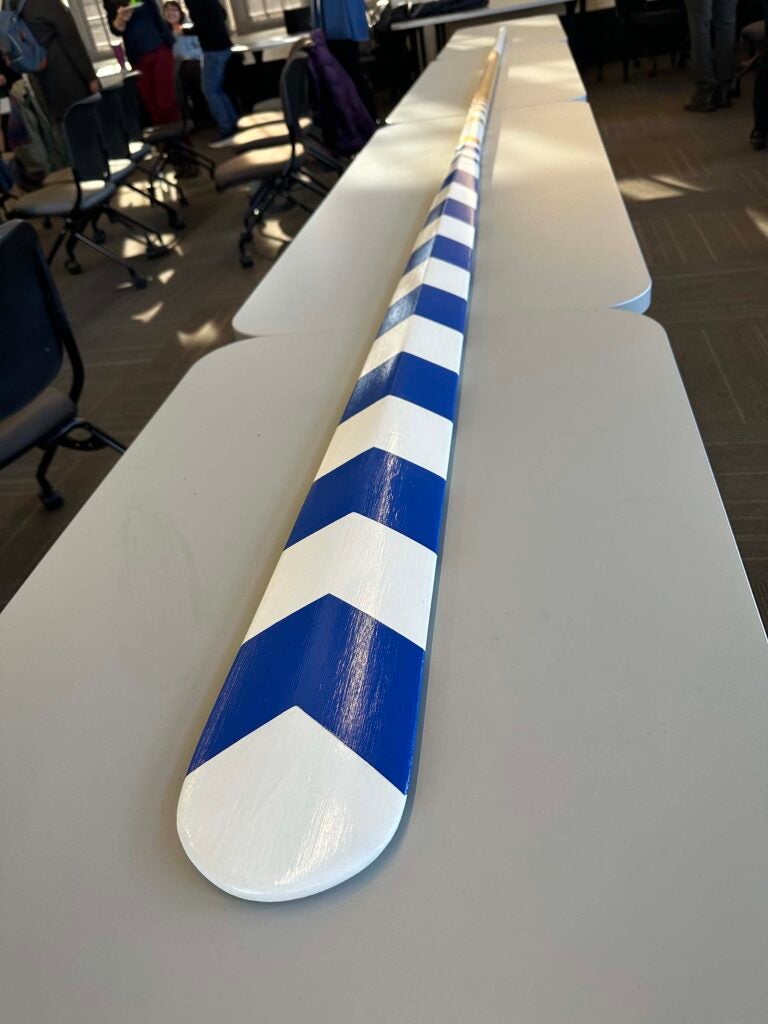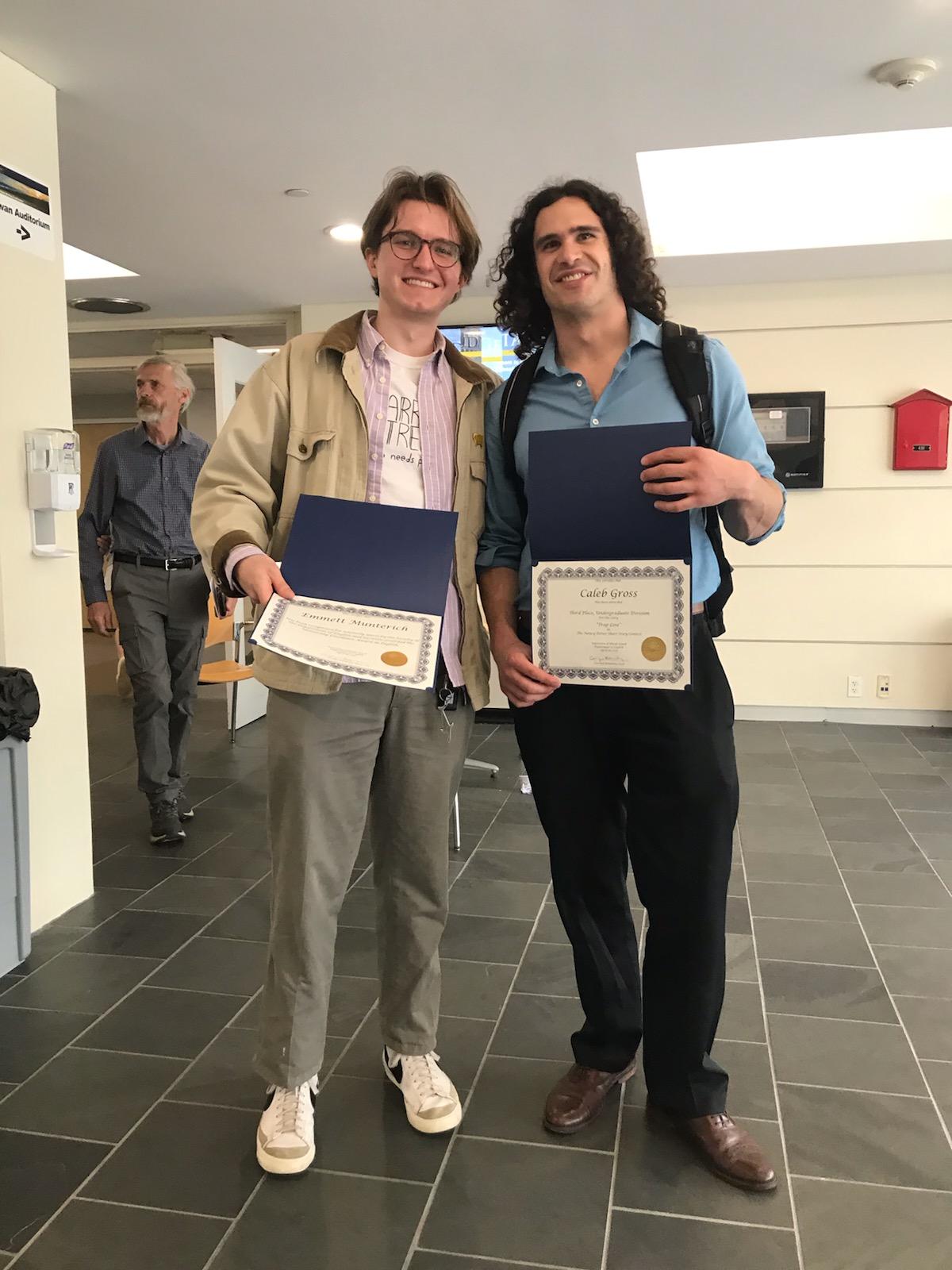KINGSTON, R.I. – Jan. 10, 2024 – University of Rhode Island students graduating in 2023, whether in December or May, navigated some challenging currents during their recent college years.
Recently graduated Caleb Gross is one.
The English major used his time at URI to explore subjects that piqued his intellectual curiosity and to complete the University honors program before graduating in December at the University’s first fall commencement.
Gross graduated with a major in English (creative writing) and a minor in Italian and also completed the URI Honors Program. The different graduation date suited his path just fine, he says.
While Gross says his college journey has been atypical, his recent honors project subject is a fitting academic coda for a life near water and wood. Gross was born and raised in South Kingstown, a stone’s throw from the mouth of the Saugatucket River, and has spent much of his life working on local oyster farms. Matunuck, where he’s lived most of his life, has an even more revered place in Gross’ heart. After high school, Gross took time to see the world and gain hands-on skills.

In December, he delivered a capstone honors project presentation in Lippitt, paying homage to the remèri of Venice, makers of the traditional wooden oars plied by centuries of Venetian gondoliers.
Gross says that former Honors Program Director Lynne Derbyshire was an encouraging guide during his time at URI. “She became my unofficial advisor,” he says, “and we met often.” Derbyshire challenged him to become part of the Honors Program, and he’s glad she did.
“The honors courses I took at URI have been among the more interesting and stimulating courses I’ve taken,” Gross says.
He says many classes and professors along the way had an invaluable impact on his college career, citing professors Roy Bergstrom, Michelangelo La Luna, Heather Johnson, Talvikki Ansel, Vincent Colapietro, Hilary Emerson, as well as Daniel Petrin and Maria Mansella.
Emerson, coordinator of Italian at URI, says Gross was a pleasure to have in class. She taught him in Italian Cinema last spring and says, “Caleb was an engaged, thoughtful, and intellectually curious student. He welcomes new ideas and points of view.”
It was in one of La Luna’s Italian classes that the seed for Gross’ honors project was planted.
During a homework assignment in the “Civilizations of Italy” class, a brief study of the region of Veneto (of which Venezia is the capital), Gross became enthralled — and concerned — with the disappearance of Venice’s gondolas, gondoliers, and the craftsmen that keep it all “afloat.” In the 17th and 18th centuries, 9,000 gondolas glided along the canals of Venice; today, there are only about 400. Something about that art and history spoke to Gross and he received enthusiastic support from Heather Johnson who believed in Gross’ honors project and sponsored him.
“To her, I am forever grateful,” he says. “The courses I’ve taken with Professor Johnson at URI have been some of my favorite and most inspiring.”
Gross built the oar in the yard of his family home in Perryville with lumber sourced from Liberty Cedar in West Kingston. He brought a background in woodworking, as he studied and worked in the field of wooden boatbuilding from ages 19 to 23, under master shipwright Louis Sauzedde (Tips From a Shipwright). The hands-on project was followed by a short film he made detailing the experience of making a “remo.”
“Ever since I was young, I’ve had a great fascination with wood, water, trees and history,” Gross says. “I have always been moved by the shapes that nature has to offer. I wanted to make a remo for the same reason that I wanted to study the Italian language. It is beautiful.”
The goal of Gross’ project was not to produce a completely authentic remo or model of one. With only three authentic remèri left in the world today, he could not become a true craftsman in the time period needed to learn the craft as an “apprendista.”
But Gross was struck by how Venetian history connects to climate change and hopes his final piece will live as a symbol of beauty and tribute to the skill and craftsmanship of the remèri of Venezia.
“Tradition, craft, and culture won’t stay alive on their own,” he says. “I hope this project promotes curiosity in — and appreciation of — a woodworking tradition that is of global importance.”
Now graduated, Gross is looking forward to more opportunities to follow his language interests after URI, make his way to Italy to see some remi up close, and pursue his interests in ecology, history and social impact. Gross says that URI gave him confidence in his abilities and has shown him possible career paths where writing might take him. “That is my broader goal in my life: to make the world curious about nature, about other cultures, about traditions and history — the ‘why’ and ‘how’ of things, not just the ‘who, what and where.’”

